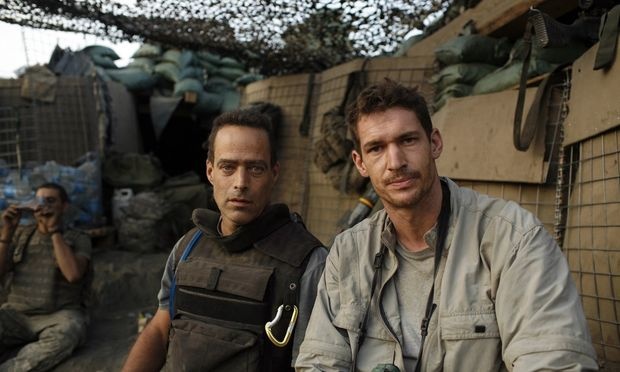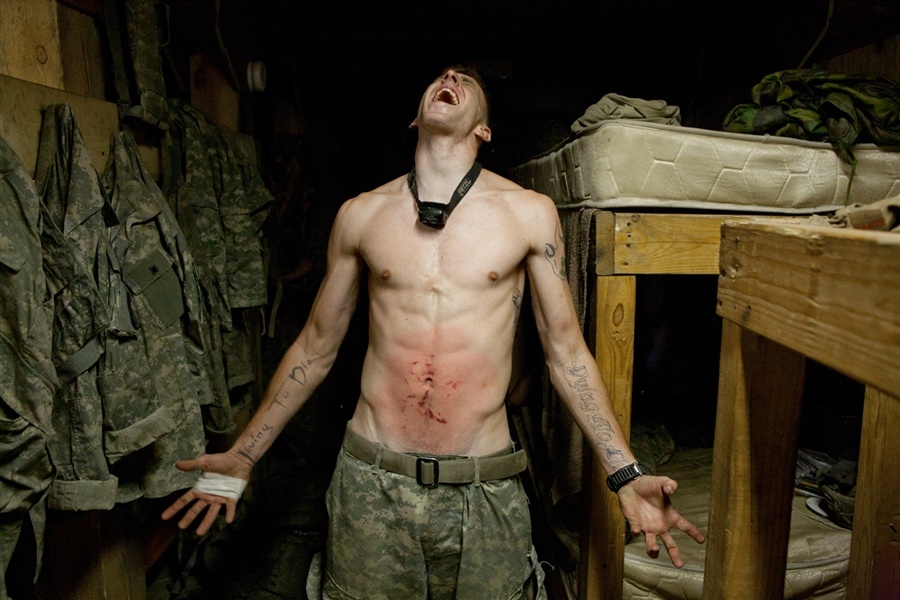The scene starts gleefully. Tim gives a stand-up intro to the camera about the hard march they just took while cracking an ear-to-ear smile at the prospect of a cold one. It’s throwaway footage, not part of the project that he and fellow war photographer James Brabazon were there to do. But it’s one of those moments between moments that needed to be documented for its absurdity. The tough-it-out slogging of war reportage meets the eerie-but-hilarious coincidence of abandoned infrastructure. Spring Break: Liberia.
But things at the beer factory turn pear-shaped (probably after the rebels imbibe their share of suds) and the frantic energy of young rebels with guns transforms from showmanship to menace. The wild-eyed leader of the group accuses the only medic tending to the wounded of being a spy for the government. The medic is led into what looks like a loading dock and we see through Tim’s camera as the rebel leader waves a pistol in the medic’s face and threatens to execute him like he’s done others in the past.
Videos by VICE
James Brabazon, who invited Tim to come along on the embed, steps back to get a wide shot. He’s seen executions before. But Tim intervenes, grabbing the leader’s gun and explaining that killing the only medic they have makes no sense.
“He did the right thing,” Sebastian Junger told me last week when we met at HBO’s headquarters in Manhattan. “I mean the rebels were out of control, on drugs, whatever. They were not a professional army. A lot of innocent people were getting executed and he knew that, and this is one he could stop. So he did.”

Tim and Sebastian. Photo courtesy of HBO
Intervening during the course of documenting the atrocities of war is unusual for photojournalists, and what Tim did could easily be seen as a rookie mistake (It was Tim’s first time covering war). But what becomes clear through Which Way is that Tim’s project as a photographer was to look beyond the circumstances of conflict to find the harder-won truths of humanity. And his actions in that moment in Liberia exemplify both his compassionate spirit and the unfortunate lengths that his mission as an artist took him.
Tim died covering the Libyan revolution two years ago when he and a group of other journalists were struck by mortar fire in Misrata. Sebastian’s film, which premiered recently on HBO, is a moving obituary. But it’s also an extension of the collaborative work that Sebastian and Tim started when they made their Oscar-nominated documentary about a platoon of soldiers in the Korengal Valley of Afghanistan, Restrepo.
That film showed the bonds of love between men at the front line: the I-will-die-for-you relationships that holds together a unit through the harrowing moments of conflict. When you turn the camera away from the bombs and towards the men who launch them, you glimpse something eternal about our survival as a species: holding together.
Which Way goes one step further and points the camera at those who normally hold it. And it turns out that the urge to create, to make art, and find what’s beautiful behind the horrid might be as essential to being a human as fighting others.
Trailer for “Which Way is the Front Line from Here?” Courtesy HBO
I know that sounds cheesy as fuck but spending two hours in Hetherington’s world is intoxicating. Here’s more from my conversation with Sebastian, an enviably talented storyteller in his own right.
VICE: At one point in the film, Tim says that he’s “not interested in photography per se.” What do you think he meant by that?
Sebastian Junger: That was something he said many times in conversation with me and in interviews. You know I think someone of his creative talent and genius easily feels limited by things. And I think he saw the possibilities of photography, but was also very aware of its limitations. I think what he really wanted was to experience the world and understand the human struggle. That’s really what he wanted. Photography was kind of his excuse to do that. He just also was extremely talented and so became extremely good photographer, but it just wasn’t the central narrative in his head of what he was trying to get out of the world—it was a means to an end.


Top: Cunningham, Korengal Valley, Kunar Province, Afghanistan, 2008. Bottom: Specialist Tad Donoho, Korengal Valley, Kunar Province, Afghanistan, 2008. Courtesy Yossi Milo Gallery
In making the film, did you learn something about him that you didn’t know before?
I wasn’t quite so aware of the gentler side of him. I didn’t realize that until I saw the footage he shot from Sri Lanka. I’d known him in the context of war and that requires a certain set of characteristics and behaviors, and the way he was with children he photographed was so sweet and I just didn’t quite ever see that, certainly not at work. And that was a really nice discovery and I kind of got to know him a little bit better in doing the film because I saw him in all these unguarded moments and, yeah that was really nice.
One unguarded moment that I thought was poignant was at the beginning of Which Way, where we see outtakes of Tim trying to explain what his mission as a photographer was all about, finding the right words but criticizing himself for being clichéd.
That was sort of classic Tim. He over thought everything and made his life a lot harder because of that. But he also understood the media and he understood what the media wants, what the media is satisfied with is a very low level of understanding. So you can sort of put out a boilerplate, humanistic sensitivity about the human struggle and no one’s going to bat an eye—that’s what they expect, it doesn’t mean much, but it works fine. And Tim was smart enough to realize that that’s really bullshit, and that anyone can pay lip service to that stuff and it doesn’t mean anything and so he was self correcting because the media can’t be bothered to correct in that situation, you know they’re fine with the first thing he said, but Tim wasn’t fine with it and he realized he was not being honest and was not saying something of real meaning and so he kept correcting himself, that was classic Tim.
What did you learn from Tim?
I learned how to not focus on the obvious aspects of a story, and most dramatic aspects of a story, particularly combat.I learned to sort of look at what was happening one or two layers beneath in the sort of emotional realm. I learned to do that.
Did things you learned from Tim affect the way you told his story in the film?
It affected the traits of his that I focused on. This is sort of circular, but it got me to focus on that part of him that I had learned from.
“Diary,” by Tim Hetherington, 2010
Do you remember the first Time you met Tim?
Yeah it was at the departure gate a Heathrow airport on our way into Afghanistan on assignment for Vanity Fair.
You knew of him before?
Kind of, I mean I knew that this extraordinary film had been shot in Liberia and one of the reasons I chose Tim to work with. One of the reasons I wanted to work with Tim was because he was an excellent photographer so Vanity Fair wanted to hire him but also I knew that he could shoot video so I said ‘look, I have this movie project, Vanity Fair has nothing to do with it, but you might be interested,’ and he was.
What’d you guys talk about on the plane?
Girls probably, I don’t remember. I probably told him a lot about what it was like over there. He really liked to laugh, big laugh. He was pretty close to perfect to people who encountered him. He was, psychologically, very complicated and had some real veins of deep unhappiness running through him, real torment. And eventually that came out in his relationships with other people who were close enough to him. I don’t mean just romantic relationships, those too, but even in our friendship. He was complicated. But he was a really, deeply good person.
This post originally appeared at VICE.
More from Tim:
More
From VICE
-

Screenshot: Shaun Cichacki -

Screenshot: Sony Interactive Entertainment -

Screenshot: Shaun Cichacki -

Image: Paramount Pictures
